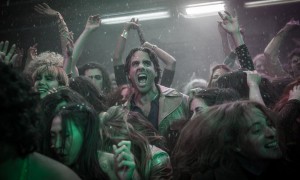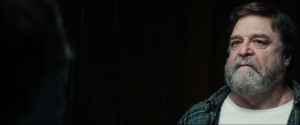The Most Interesting Scene in “Mr. Robot” S2E1

ursoscrewed.png
I remain absolutely riveted by USA’s Mr. Robot. It’s like a slow-motion horror movie—like literally if you took a horror movie about a man losing his mind and slowed it to like 1/8th speed, you would have Mr. Robot‘s episodes. Then a brilliant fan theory starts going around online that makes me appreciate what the show is doing even more. I mean, there simply isn’t another show out there operating on Mr. Robot’s visual and atmospheric level right now.
The show’s not perfect, of course, but every episode offers something, usually a sequence that is simply a brilliant mini-movie. This got me thinking about a sequence in the season two premiere that isn’t getting a lot of heat, but I think should: the hacking and takeover of Susan Jacobs’ smart house.
It’s no secret that Mr. Robot often films its episodes like a horror movie instead of a techno thriller or a story about hackers who actually kinda sorta resemble the real thing instead of the Hugh Jackman speed-typing sort you usually get. The lighting, framing, angles, and music all combine to offer up a tableau of dread that is very effective. And this scene is like a mini-horror movie without a payoff—or perhaps a delayed payoff to come.
Mild spoilers to follow if you care about spoilers.
Susan Jacobs is very rich woman, counsel to E Corp. She has a very nice townhome. It’s got a pool, a spa-like bathroom, and a “smart home” system that allows Susan to control everything via iPad. It’s kind of awesome, until she comes home and everything is misbehaving. The alarm won’t stop going off. Music blares at unbearable levels. Her shower is burning hot and the air conditioning has the place at 40 degrees. The TV won’t shut off.
She’s lost control.
The whole sequence is filmed like a horror movie and so it should, as the idea that by bringing these technologies into our homes we’re giving control of some of the most essential aspects of our lives—our shelter—into the hands of a) unseen corporate interests and their drones or b) hackers is kind of scary. By the time we get a smash cut to Jacobs, wearing a winter coat indoors and screaming into the phone that she can’t unplug anything because the wires are buried in the walls, we know she’s totally screwed. She schedules a service call, calls a car, and flees to her country house because of course she has a country house. And literally moments later, F Society shows up, turns everything off, and takes control of the house. They set everything to go crazy just to drive her away. Now they have weeks of using this awesome house for free.
Clever, but what’s really clever about it is how this sequence underscores something interesting: The hackers aren’t the heroes of this show. There are no heroes on this show. The hackers are just as menacing and destructive as the evil corporation. The hackers managed to erase the debts of millions, but this supposedly Robin Hood-like move has destabilized the world, and regular people are shown having to deal with the negative side of this Fight Club ideal: Sure, their debts have been erased … but so has all evidence that they paid those debts in the first place. As a sequence showing a woman desperately trying to convince the bank that she is up to date on her mortgage show, erasing all that data won’t cause the banks to shrug and say well, we can’t prove you owe us money so we guess you don’t! Instead, the more likely scenario is that we’d all find ourselves forced to prove the negative: That we don’t owe them money.
The theft of the smart house should be a chilling sequence for anyone who has a Nest installed and is thinking about an Internet-enabled lock or something. It should also serve as clear evidence that the show doesn’t think there’s really any difference between the hackers and the corporations. They both steal whatever they want, and the people who don’t understand the complex systems they administer—computers and the Internet Vs. money and finance—are doomed to be the victims of the people who do.

 In 2002, a year in which otherwise almost nothing I can remember happened, the New York Times reported that “a recent survey” confirmed the worst fears of many Americans:
In 2002, a year in which otherwise almost nothing I can remember happened, the New York Times reported that “a recent survey” confirmed the worst fears of many Americans: 







